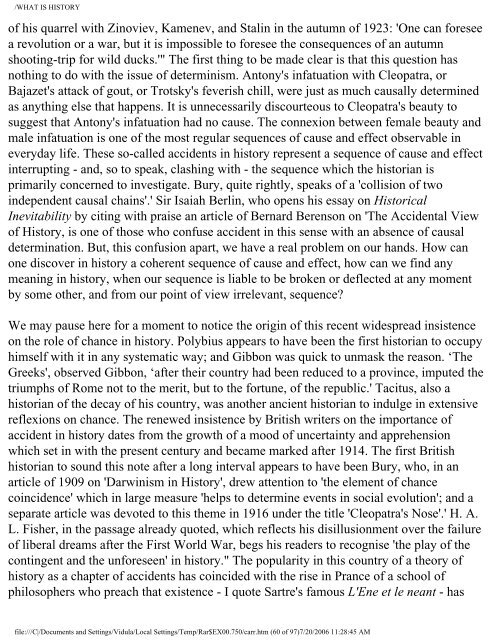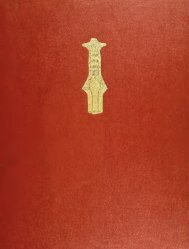What is History / by Edward Hallett Carr - Universal History Library
What is History / by Edward Hallett Carr - Universal History Library
What is History / by Edward Hallett Carr - Universal History Library
Create successful ePaper yourself
Turn your PDF publications into a flip-book with our unique Google optimized e-Paper software.
WHAT IS HISTORY<br />
of h<strong>is</strong> quarrel with Zinoviev, Kamenev, and Stalin in the autumn of 1923: 'One can foresee<br />
a revolution or a war, but it <strong>is</strong> impossible to foresee the consequences of an autumn<br />
shooting-trip for wild ducks.'" The first thing to be made clear <strong>is</strong> that th<strong>is</strong> question has<br />
nothing to do with the <strong>is</strong>sue of determin<strong>is</strong>m. Antony's infatuation with Cleopatra, or<br />
Bajazet's attack of gout, or Trotsky's fever<strong>is</strong>h chill, were just as much causally determined<br />
as anything else that happens. It <strong>is</strong> unnecessarily d<strong>is</strong>courteous to Cleopatra's beauty to<br />
suggest that Antony's infatuation had no cause. The connexion between female beauty and<br />
male infatuation <strong>is</strong> one of the most regular sequences of cause and effect observable in<br />
everyday life. These so-called accidents in h<strong>is</strong>tory represent a sequence of cause and effect<br />
interrupting - and, so to speak, clashing with - the sequence which the h<strong>is</strong>torian <strong>is</strong><br />
primarily concerned to investigate. Bury, quite rightly, speaks of a 'coll<strong>is</strong>ion of two<br />
independent causal chains'.' Sir Isaiah Berlin, who opens h<strong>is</strong> essay on H<strong>is</strong>torical<br />
Inevitability <strong>by</strong> citing with pra<strong>is</strong>e an article of Bernard Berenson on 'The Accidental View<br />
of H<strong>is</strong>tory, <strong>is</strong> one of those who confuse accident in th<strong>is</strong> sense with an absence of causal<br />
determination. But, th<strong>is</strong> confusion apart, we have a real problem on our hands. How can<br />
one d<strong>is</strong>cover in h<strong>is</strong>tory a coherent sequence of cause and effect, how can we find any<br />
meaning in h<strong>is</strong>tory, when our sequence <strong>is</strong> liable to be broken or deflected at any moment<br />
<strong>by</strong> some other, and from our point of view irrelevant, sequence?<br />
We may pause here for a moment to notice the origin of th<strong>is</strong> recent widespread ins<strong>is</strong>tence<br />
on the role of chance in h<strong>is</strong>tory. Polybius appears to have been the first h<strong>is</strong>torian to occupy<br />
himself with it in any systematic way; and Gibbon was quick to unmask the reason. ‘The<br />
Greeks', observed Gibbon, ‘after their country had been reduced to a province, imputed the<br />
triumphs of Rome not to the merit, but to the fortune, of the republic.' Tacitus, also a<br />
h<strong>is</strong>torian of the decay of h<strong>is</strong> country, was another ancient h<strong>is</strong>torian to indulge in extensive<br />
reflexions on chance. The renewed ins<strong>is</strong>tence <strong>by</strong> Brit<strong>is</strong>h writers on the importance of<br />
accident in h<strong>is</strong>tory dates from the growth of a mood of uncertainty and apprehension<br />
which set in with the present century and became marked after 1914. The first Brit<strong>is</strong>h<br />
h<strong>is</strong>torian to sound th<strong>is</strong> note after a long interval appears to have been Bury, who, in an<br />
article of 1909 on 'Darwin<strong>is</strong>m in H<strong>is</strong>tory', drew attention to 'the element of chance<br />
coincidence' which in large measure 'helps to determine events in social evolution'; and a<br />
separate article was devoted to th<strong>is</strong> theme in 1916 under the title 'Cleopatra's Nose'.' H. A.<br />
L. F<strong>is</strong>her, in the passage already quoted, which reflects h<strong>is</strong> d<strong>is</strong>illusionment over the failure<br />
of liberal dreams after the First World War, begs h<strong>is</strong> readers to recogn<strong>is</strong>e 'the play of the<br />
contingent and the unforeseen' in h<strong>is</strong>tory." The popularity in th<strong>is</strong> country of a theory of<br />
h<strong>is</strong>tory as a chapter of accidents has coincided with the r<strong>is</strong>e in Prance of a school of<br />
philosophers who preach that ex<strong>is</strong>tence - I quote Sartre's famous L'Ene et le neant - has<br />
file:///C|/Documents and Settings/Vidula/Local Settings/Temp/Rar$EX00.750/carr.htm (60 of 97)7/20/2006 11:28:45 AM







